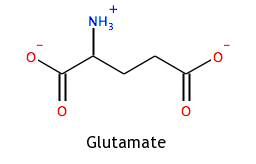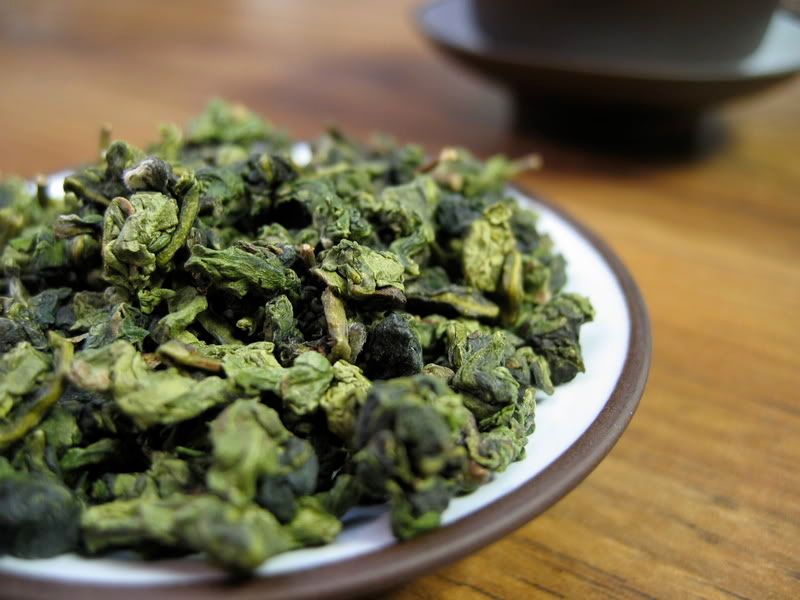 Gamma-aminobutryic acid (GABA) is the main inhibitory neurotransmitter in the brain. A neurotransmitter is essentially a molecule that one neuron sends to an adjacent neuron in order to excite or inhibit it from sending a signal. While GABA is the main inhibitory neurotransmitter in the brain, glutamate is the main excitatory one. Glutamate and GABA compete, in a way, to drive neurons to be more or less active. In general, altering glutamate or GABA levels in the brain can have global effects on the organism. A drop in GABA level or an increase in glutamate level, for instance, can cause seizures; likewise, a drop in glutamate level or an increase in GABA level can cause drowsiness or even coma.
Gamma-aminobutryic acid (GABA) is the main inhibitory neurotransmitter in the brain. A neurotransmitter is essentially a molecule that one neuron sends to an adjacent neuron in order to excite or inhibit it from sending a signal. While GABA is the main inhibitory neurotransmitter in the brain, glutamate is the main excitatory one. Glutamate and GABA compete, in a way, to drive neurons to be more or less active. In general, altering glutamate or GABA levels in the brain can have global effects on the organism. A drop in GABA level or an increase in glutamate level, for instance, can cause seizures; likewise, a drop in glutamate level or an increase in GABA level can cause drowsiness or even coma. ***Related tangent: Fortunately, it is very difficult to disturb amino acid neurotransmitter levels to this extent, partly because of the blood-brain barrier. This is just what it sounds like: it keeps bad things out of the brain. Glutamate is actually the least likely amino acid to cross the blood-brain barrier into the nervous system, which could be an evolutionary reason for its adoption as the main excitatory neurotransmitter in the brain. This is important, because if the primary excitatory amino acid could cross this barrier, our brains would work themselves to death with each meal we ate. Needless to say, this would be very, very bad.***
***Related tangent: Fortunately, it is very difficult to disturb amino acid neurotransmitter levels to this extent, partly because of the blood-brain barrier. This is just what it sounds like: it keeps bad things out of the brain. Glutamate is actually the least likely amino acid to cross the blood-brain barrier into the nervous system, which could be an evolutionary reason for its adoption as the main excitatory neurotransmitter in the brain. This is important, because if the primary excitatory amino acid could cross this barrier, our brains would work themselves to death with each meal we ate. Needless to say, this would be very, very bad.***I will talk a bit more about GABA later, but for now, here's a review:
2007 Spring GABA (Jia Yeh) Oolong from Hou De Asian Art
Class: Oolong
Origin: Zhu Shan, Nan Tou, Taiwan
Year: 2007
Vendor: Hou De Asian Art
Price: $12.50 (2oz)
This was an interesting experience, to say the least. No, I did not notice any relaxing or sedative effects beyond those I normally feel after drinking tea, but this tea is not all novelty, as it has some interesting and potentially enjoyable gastronomic properties.
First, some quick background. As I have mentioned once or twice before on Tea Nerd, nitrogen flushing is a good preservative for tea, as it displaces oxygen and slows down the post-production oxidation process. In Japan, in 1986, it was accidentally found that exposing raw tea leaves to an anaerobic (no oxygen), nitrogen-rich environment caused the concentration of GABA inside the leaves to increase, and thus the creative term "GABA tea" was coined. The Japanese apparently developed a fondness for the beverage, and Taiwan began tweaking its method of production to increase GABA content and improve flavor. GABA oolong has since become one of Taiwan's major exports, according to Hou De.
 The dry leaf, as the Hou De product page describes, has a strong mango and guava fragrance. I also thought I picked up a bit of peach, but it's hard to say when there are so many different fruit aromas simultaneously assaulting my brain. Actually, the fruit fragrance was SO powerful that it was a little overwhelming (in a not-so-great way) and made this tea's nose fairly unbalanced.
The dry leaf, as the Hou De product page describes, has a strong mango and guava fragrance. I also thought I picked up a bit of peach, but it's hard to say when there are so many different fruit aromas simultaneously assaulting my brain. Actually, the fruit fragrance was SO powerful that it was a little overwhelming (in a not-so-great way) and made this tea's nose fairly unbalanced. As for looks, you can see from the picture that they are nice little rolled-up balls, which is pretty standard for Taiwanese teas. There is very little green here—most of the leaves are shades of tans and browns.
 The liquor brews to a nice light brown, which I have tried to capture here. It smells very similar to the dry leaf, and tastes like it smells. There are strong mango and guava flavors, a nice sweet aftertaste, and a smooth feel especially in earlier infusions (interestingly, some of the earlier infusions taste similar to sweeter second flush Darjeelings). A bit of an artificial taste comes out in the later infusions. Overall there is not much that tastes bad about this tea, but I don't think the flavors are well balanced, as the fruitiness dominates completely. One more thing that I noticed here was that the tea had a long-lasting drying effect, but in the absence of anything I would normally call astringency. It was odd, and felt like I was eating flour. I'm a bit weird and actually enjoy eating flour, so this wasn't a bad thing in my opinion.
The liquor brews to a nice light brown, which I have tried to capture here. It smells very similar to the dry leaf, and tastes like it smells. There are strong mango and guava flavors, a nice sweet aftertaste, and a smooth feel especially in earlier infusions (interestingly, some of the earlier infusions taste similar to sweeter second flush Darjeelings). A bit of an artificial taste comes out in the later infusions. Overall there is not much that tastes bad about this tea, but I don't think the flavors are well balanced, as the fruitiness dominates completely. One more thing that I noticed here was that the tea had a long-lasting drying effect, but in the absence of anything I would normally call astringency. It was odd, and felt like I was eating flour. I'm a bit weird and actually enjoy eating flour, so this wasn't a bad thing in my opinion.The wet leaves didn't smell all that different from the dry leaves, although I swear I caught a slight whiff of menthol or camphor (nothing like what can be found in puerh, though). It is a very pleasant aroma—definitely enjoyable.
 Then I dug into the leaf pile. The leaves are still attached to their stems, for the most part, which is a sign of hand-picking. However, it was fairly stemmy and sometimes I noticed that the 3rd and 4th leaves were attached to the stem in addition to the standard 2 and a bud. I could be wrong (please correct me if I am), but I have read that the lower leaves are of inferior quality. Still, as Salsero has reminded me, it's more about the taste than the little nitpicky things.
Then I dug into the leaf pile. The leaves are still attached to their stems, for the most part, which is a sign of hand-picking. However, it was fairly stemmy and sometimes I noticed that the 3rd and 4th leaves were attached to the stem in addition to the standard 2 and a bud. I could be wrong (please correct me if I am), but I have read that the lower leaves are of inferior quality. Still, as Salsero has reminded me, it's more about the taste than the little nitpicky things.Overall, I thought it tasted quite decent. Maybe not incredibly complex, but certainly drinkable. Personally I would have enjoyed this tea far more if it were not for the unbalanced flavor profile, but if you are looking for an intensely fruity unflavored tea, this is the one for you.
The gabber about GABA
Back to the biology behind GABA (woo hoo!). Earlier, I mentioned that altering GABA and glutamate levels in the brain can have generalized effects on the overall activity of the brain, and GABA tea works on this principle-- more GABA = more inhibition. However, a far more common (and effective) method of altering GABA's activity in the brain is to modify its receptors' function.
***Yet another related, but important, tangent: The most important thing to know about neurotransmitters is that they do NOT produce their biological effect in the absence of their functioning receptors. A good analogy is to think of neurotransmitters as keys, and receptors as locks.
 If you have a key, it won't open any door without a matching lock it can fit into. Neurotransmitters are the same way— GABA, for instance, just binds to a receptor, but for the most part, the receptor protein is what effects the cellular changes in the cell it is attached to.***
If you have a key, it won't open any door without a matching lock it can fit into. Neurotransmitters are the same way— GABA, for instance, just binds to a receptor, but for the most part, the receptor protein is what effects the cellular changes in the cell it is attached to.***You all know of chemicals that increase the activity of GABA receptors/ion channels (I won't go into the details of how ion channels work in neurons, but you can google or wikipedia it if you like), though you might not know that this is how they work. The most common examples are alcohol (ethanol, to be specific) and benzodiazapines (such as Valium), but there are many more. These molecules cause the GABA receptors to produce stronger effects in the cells they are attached to, and thus bring about a relaxing, drowsy sensation.
While we're on the subject, L-theanine is also known to affect the GABA system, though in a different way. While ingesting GABA is not a very effective method of increasing GABA levels in the brain, L-theanine causes the brain to produce more GABA itself. This is much more effective and is the reason why tea does not give as harsh a caffeine buzz as coffee. I'm thinking of doing a more in-depth post about L-theanine later, so keep your eyes peeled.
Wrap-up
Though GABA tea does seem to have mild effects on the GABA system in the brain, it is not nearly as potent as some other substances due to its inefficient method of action (it probably takes the single most difficult path to the brain). So, you won't get sleepy by drinking it, but it's still kinda cool. Now, make sure you remember all of this&mdash it will be on the test.












